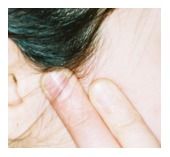TMJ is the joint that connects the lower and upper jaw. The term TMJ stands for Temporo-mandibular Joint. This is one of the most complex joints in the entire body, capable of forward and backward movement, rotations, and side-to-side movements. TMJ often refers to complications and problems with this joint. Some of the most common symptoms of TMJ problems are:
- Pain
- Limited movement of the lower jaw
- Clicking sounds
- Muscle spasms
- Locking of the jaw
Some potential causes of the disease include genetics, hormones, low-level infections, auto-immune diseases, trauma, and clenching or grinding of the teeth. Diagnosis and evaluation of such conditions are performed by dentists experienced in TMJ problems and treatments. Some common treatments are Night Guards, Bite Guards, and Bite Adjustments. Your dentist can guide you toward the best treatment for you.
If you experience any TMJ problems or symptoms please let us know. The doctor will be happy to evaluate your situation and offer the best treatment possible.
Go back to Patient Education